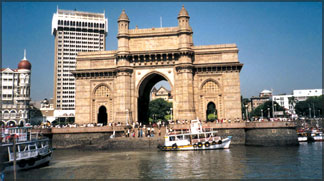Reviewing the SAARC process
Bhim Prasad BHURTEL
The 15th summit of the South Asian Association for Regional
Cooperation (SAARC) has been scheduled to be held in Colombo, Sri Lanka
from July 27 to August 3, 2008.
Almost two decades after enunciation, the objectives in the Charter;
despite some achievements in aggregate and discrete realms, the goals to
improve the quality of life remains largely immaterialised for the
majority of people in Member States.
The elemental fact is the entire SAARC process is not focused on
issues of democracy and human rights. Since its inception SAARC seems to
focus on technical or economic cooperation.
|

The Gateway of India |
In the past, SAARC was taken as a club of military/monarchical
dictators and unaccountable so-called democratic leaders. Now the
situation has changed. SAARC should not continue such a legacy.
Recently, South Asian for Human rights, a regional INGO (former
Indian PM I.K. Gujral is chairman) has carried out an assessment on
SAARC’s role. The purpose of the study was to obtain an update of SAARC
process in two matters, democracy and human rights.
The attempt was focused to recommend the possible role of South Asian
civil societies to intervene on the issues. The civil society can play a
greater effective role to promote human rights and deepening democracy
within the framework of SAARC.
Fortunately, I got that opportunity. I found SAARC needs to address
democracy and human rights substantially in principles, provisions and
processes. It is high time to review the SAARC process as to weather it
is meeting the aims and objectives contained therein the Charter.
The political system affects the life of the people in Member States.
This is a sensitive subject no doubt; however there could be some
commitment by the leaders of the region, at least at a philosophical and
theoretical level in favour of democracy and human rights within the
SAARC process.
The SAARC Charter makes no mention of democracy, the system of
government it wishes to develop as an instrument to accomplish the
social and political goals that South Asians aspire to. It was probably
natural in 1980s, considering the character of the majority of founding
regimes that could not have absorbed such sentiments readily.
However, now there should be no need to continue the cold war legacy.
Despite the collapse of USSR and wave of democracy, SAARC is showing an
indifference to democracy.
The Charter came close to making a statement remotely resembling an
ideology as mentioned under Article I, the need “to provide all
individuals opportunity to live in dignity and to realize their full
potentials”.
But all know the tradition among the Third World authoritarians, in
which such concession is only a part of the routine where they feel
obliged to talk about people’s participation, social progress and even
cultural development.
There is an earnest need to review the principles of SAARC to address
these issues. Firstly SAARC should address civil and political rights,
economic, social and cultural rights, and secondly democracy as the
instrument to ensure human rights through accountable and transparent
governance in the region.
India’s role is particularly crucial. As the biggest and oldest
functioning democracy in the region, with tremendous economic clout, it
is certainly in position to take SAARC in this direction.
The political leadership will not be ready easily in South Asia. So,
South Asian civil society has a lot to do together. The prevailing
atmosphere of mistrust especially in India-Pakistan relationship at the
governments’ level along with the civil society and non-governmental
engagement is hindering the SAARC process.
The true civil society can play a pivotal role for regional
solutions. South Asians should learn from the other regional
articulations and engagements.
In short, South Asians must realise the South Asian dream that is
derived not so much from our past glory, perhaps, as by the
opportunities we see ahead for responsibly fulfilling South Asian
destiny.
The dream then captures the imagination of more than 1.6 billion
people in the region, irrespective of the intrusion of state boundaries,
religion, ethnicity, gender, caste, creed, political belief and other
social characteristics.
This is a formidable challenge, but a challenge we must face. |

